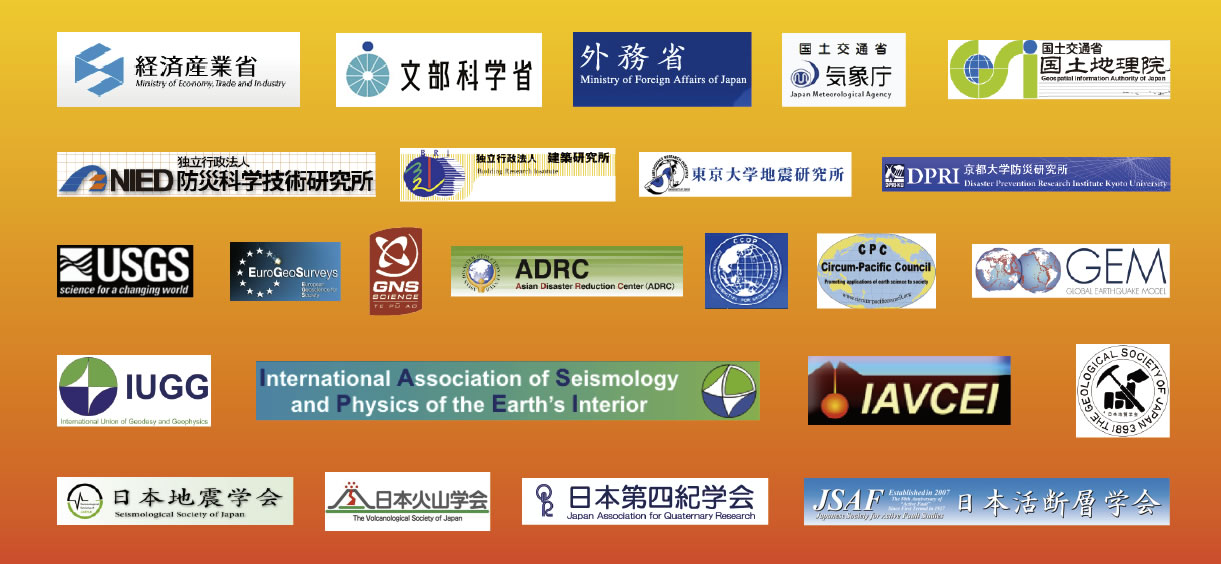- Date:
- Feb. 22 (Wed) – 25 (Sat), 2012
- Venue:
- Auditorium, AIST Tsukuba Central, Tsukuba, Japan
- Hosted by:
- Geological Survey of Japan, National Institute of Advanced Industrial Science and Technology (AIST)
- Supported by:
- Ministry of Economy, Trade and Industry (METI), Ministry of Education, Culture, Sports, Science and Technology (MEXT), Ministry of Foreign Allairs of Japan (MOFA), Japan Meteorological Agency (JMA), National Research Institute for Earth Science and Disaster Prevention (NIED), Building Research Institute (BRI), Earthquake Research Institute, University of Tokyo (ERI), Disaster Prevention Research Institute, Kyoto University (DPRI), United States Geological Survey(USGS), EuroGeoSurveys, GNS Science, Asian Disaster Reduction Center(ADRC), Coordinating Committee for Geoscience Programmes in East and Southeast Asia(CCOP), Circum-Pacific Council (CPC), Global Earthquake Model(GEM), International Union of Geodesy and Geophysics (IUGG), International Assosication of Seismology and Physics of the Earth's Interior (IASPEI), International Association of Volcanology and Chemistry of the Earth's Interior (IAVCEI), Geological Society of Japan, Seismological Society of Japan, Volcanological Society of Japan, Japan Association for Quaternary Research, and Japanese Society for Active Fault Studies
- Organizing Committee Chairperson:
- Eikichi TSUKUDA, Director General of GSJ
- Secretariat:
- Research Planning Office of Geological Survey and Applied Geoscience, AIST
- Background:
- As shown by the 2011 off the Pacific coast of Tohoku Earthquake, Asia-Pacific Region is an area with high risk of catastrophic natural disasters such as earthquakes and volcanic eruptions. Once a disaster occurs, in today's highly globalized economy, it can create unpredictable turmoil all over the world, not just in the affected area. Countermeasures against these large-scale disasters are crucial for the sustainable development of the global economy to ensure human security. Now is the time to establish an effective international framework where we collaborate and develop a system to gather information on disaster mitigation in Asia-Pacific Region, including Japan.
- Purpose:
- Enhance collaboration among geological institutes within the Asia-Pacific Region and rearrange existing information about the future risk for global earthquakes and volcanic disasters.
- Build international and national networks, set up a website, and establish a consortium so that we can share and provide the information.
- Create the environment to promote cooperative research, including personnel training, in the area with little information, especially in developing countries.
- Evaluate the risk of business activities in the Asia-Pacific region and seek to develop new business opportunities to provide information on the risk of catastrophic natural disasters.
- Contribution to the society:
- Grasping disaster risk in advance enables us to reduce the damage from large-scale disasters, which are expected to cause worldwide impact on the economy. By improving the database for hazard risk information, we can assist Japanese enterprises abroad in formulating their BCP, various private businesses concerning risk reduction and nonlife insurance.
- Program contents:
- Recent Earthquakes and Volcanic Eruptions(the 2011 off the Pacific coast of Tohoku Earthquake, the 2004 Sumatora-Andaman Earthquake, the 2008 Wenchuan Earthquake, the 1991 Pinatubo Eruption, and the 2011 Kirishima Eruption, etc)
- Report of Asia-Pacific Region (Indonesia, Philippine, Singapore, Korea, Vietnam, Taiwan, USA, and Japan, etc)
- Database and risk management(V-Hub, GEO Grid, PAGER, GEM, and GVM, etc)
- Schedule:
- Feb. 21 (Tuesday): Reception (Participants from abroad)
- Feb. 22 (Wednesday): 10:00 – 17:20 Presentation, 18:00 – Welcome Dinner
- Feb. 23 (Thursday): 8:50 – 18:00 Presentation
- Feb. 24 (Friday): 9:00 – 12:00 Group Discussion, Concluding Remarks
- Poster session: Feb. 22 (Wednesday) 10:00 – Feb. 24 (Friday) 12:00
- Feb. 24 (Friday) noon – 25 (Saturday): Field Excursion
- G-EVER1 Program pdf format (270KB)
- Abstracts Volume pdf format (20.1MB)
- Presentations Sharing materials
- Speakers:
- Kenji Satake (Tokyo Univ.), Norio Maki (Kyoto Univ.), Makoto Murakami (Hokkaido Univ.), Tatsuhiko Hara (BRI), Hiroyuki Fujiwara (NIED),Takeshi Koizumi (JMA), Yukinobu Okamura (AIST), Hiroshi Shinohara (AIST), Masashi Matsuoka (AIST), Li Xiaojun (CEA), Chris Newhall (EOS), Sue Loughlin (BGS), Greg Valentine (SUNY), John Eichelberger (USGS), Bruce Houghton (Hawaii Univ.), David Johnston (GNS), David Wald (USGS), Alik Ismail-Zadeh (RAS), Ross Stein (USGS), Evgeny Gordeev (RAS), Myung-Soon Jun (KIGAM), Sin-Mei Ng (Chinese Culture Univ.), Cheng-Horng Lin (Academia Sinica), Masataka Ando (Academia Sinica), Bui Cong Que (VAST), Nguyen Hong Phuong (VAST), Niran Chaimanee (CCOP), Surono (CVGHM), Sri Hidayati (CVGHM), and Supriyati Andreastuti (CVGHM), etc
- Instruction for Oral and Poster presentations:
- Oral presentation: Please prepare a PPT file (MS-Power Point 2007 compatible) in a USB memory or CD-ROM. The PPT file should be uploaded in the AIST laptop computer before starting the author's session. (If the author prefer to use own laptop computer, please let us know)
- Poster presentation: A board in 180cm (vertical) x 120cm (width) will be provided. Please prepare a poster to fit within this board.
- Accommodation:
- Sakura-Kan (guest house) in the AIST Tsukuba Central Site and others
- Access:
- Access to the AIST Tsukuba Central
- How to get to the AIST Tsukuba from Narita International Airport


